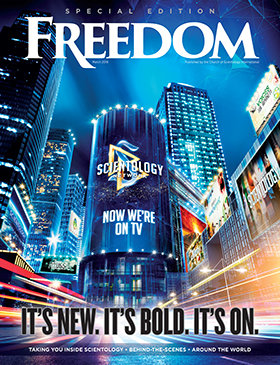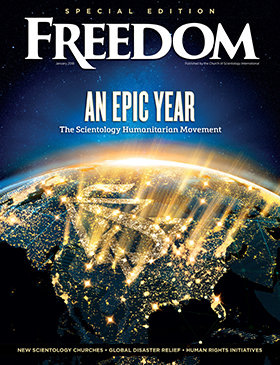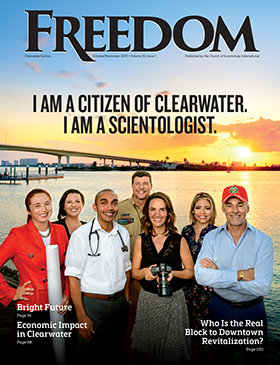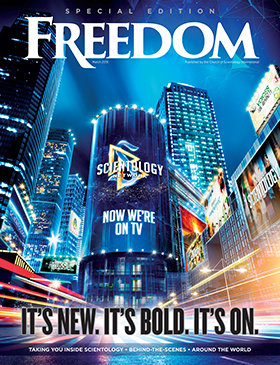
On July 11, 2015, “something” was done about “it.” Right in the middle of Clearwater.
The event was the opening of seven buildings in the two blocks on the northeast side of the intersection of Fort Harrison Avenue and Cleveland Street. David Miscavige, the ecclesiastical leader of the Scientology religion, appealed to Scientologists in the area to redouble their efforts in using their resources, skills and expertise to tackle an array of social ills, from drug abuse to human trafficking to psychiatric abuses to homelessness.

“A recent poll by the City showed that Clearwater is known for two things,” Mr. Miscavige said in an interview with Freedom. “With about equal numbers, people identify Clearwater with beaches and Scientology. Our spiritual home is in the very center of Clearwater’s downtown.”
For both the City and the Church, that offers tremendous opportunities, Mr. Miscavige commented. “We reside in a community many people regard as a paradise. And we bring vast resources and thousands of talented people to the city.
“True, Scientologists are, because of their religion, motivated to help others, and they do contribute greatly to the community. But as we grow our responsibility grows, and it has become clear that the Church can and must lend its considerable weight to tackling the most daunting challenges facing Clearwater and Florida.
“That’s what these newly opened buildings signify. Six of the buildings house social betterment and humanitarian organizations. Not only can they help, they will help. And the seventh structure, the historic Clearwater Building, is an informational resource for the citizens where they can learn the ‘what,’ ‘why’ and ‘how’ of Scientology and our programs.”
Dating back to the early years of Scientology, the Church has championed humanitarian and social betterment work. In 1956, one year after the religion’s Founding Church was established in Washington, D.C., Scientologists led opposition to federal legislation dubbed the “Siberia U.S.A.” bill, which would have created a psychiatric gulag in Alaskan wastelands where American citizens could have been committed without legal due process. The bill was eviscerated, the commitment provisions eliminated, after the Church and civil libertarians launched a campaign against the proposed legislation. The Church’s early crusades against the abuses of psychiatry led in 1969 to the creation of the Citizens Commission on Human Rights (CCHR), co-founded by Scientologists and the world’s leading contrarian psychiatrist, Thomas Szasz. CCHR has been the foremost international advocacy group in exposing and shutting down the horrific profit-driven predatory schemes of psychiatrists and companies that create and market mind-twisting psychotropic drugs.
The anti-psychiatric-abuse campaigns were a natural outgrowth of Scientology’s core mission to heal minds and spirits. But activism by Church members has spread to many other arenas, which now have special significance for Clearwater, the Tampa Bay area, Florida and, ultimately, the U.S. Southeast:
The Foundation for a Drug-Free World has reached hundreds of millions of people with what is one of the paramount lessons for humanity: drugs destroy lives.
United for Human Rights and its companion group, Youth for Human Rights, have launched campaigns across the globe to teach people about the United Nations’ Universal Declaration of Human Rights.
Criminon, inspired by Mr. Hubbard’s moral and ethical teachings, is helping thousands of prisoners each day turn their life’s failure into success.
The Way to Happiness spreads the 21 precepts of Mr. Hubbard’s nonreligious moral code; its efforts have demonstrated results in reducing violence, lawlessness and immorality.
And, the organization that actually embodies “something can be done about it” as a motto is Scientology’s Volunteer Ministers, a group dedicated to easing despair, anguish and pain in troubled and devastated areas around the world.
All of those organizations and the work they do have long been established in Florida. But the physical locations of their operations were hard to find; many were headquartered in activists’ homes.
Why? While Scientology’s presence in Clearwater is enormous, the bulk of what transpires in the religion’s spiritual headquarters, the Flag Building, and at the Fort Harrison and other buildings, is geared to advancing Scientologists in their spiritual development. The facilities were not for proselytizing, informational campaigns or operation centers for the humanitarian campaigns.
Two things have become apparent in recent years: Downtown is at the cusp of booming growth, encouraging more and more people to go to the Flag Building asking questions about Scientology; and, while the religion’s social-betterment groups have bold presences in many global cities, they were not clearly evident in the Church’s spiritual capital, Clearwater.
The solution to those related events was the total renovation of the historic Clearwater Building, which along with the Fort Harrison was one of the first two buildings Scientology acquired in the city in 1975. The “CB,” as it’s called, was originally a bank building, and its stately, two-floor lobby provides attractive, welcoming space for visitors to learn about Scientology. A large, richly appointed conference room will provide space for civic groups.

To the north of the CB, along Fort Harrison Avenue, a half-dozen other buildings were completely redone—and they house the six humanitarian organizations supported by the Church.
“If you tour the offices of the social betterment and humanitarian organizations—and this is a personal invitation for everyone in the Tampa Bay area—you’ll witness work being done,” Mr. Miscavige said. “You’ll see courses being studied, meetings and seminars underway, task forces getting ready to head somewhere in the area to fix something or help at something else.
“Each of the organizations has a story, a history to tell,” he said. “You want to find a way to tell your kids, ‘don’t do drugs,’ then you’ll find the tools to use. Are you appalled at human trafficking—not just Bangladesh or Guatemala, but right here? We have tools you can use to fight workplace and sexual slavery. What about human suffering following a natural disaster in some far-off land, or the problems of homelessness right here in Clearwater?
“Something can be done about all of those things, and more, and we will join you in the work.”


























